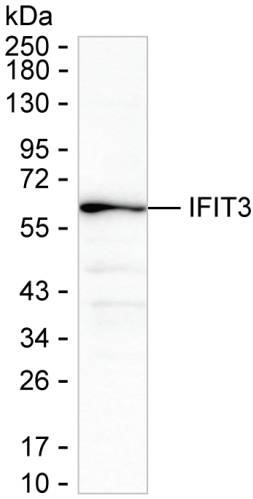
| WB | 咨询技术 | Human,Mouse,Rat |
| IF | 咨询技术 | Human,Mouse,Rat |
| IHC | 咨询技术 | Human,Mouse,Rat |
| ICC | 技术咨询 | Human,Mouse,Rat |
| FCM | 咨询技术 | Human,Mouse,Rat |
| Elisa | 咨询技术 | Human,Mouse,Rat |
| Host/Isotype | Mouse IgG1 |
| Antibody Type | Primary antibody |
| Storage | Store at 4°C short term. Aliquot and store at -20°C long term. Avoid freeze/thaw cycles. |
| Species Reactivity | Human |
| Immunogen | Purified recombinant fragment of human IFIT3 |
| Formulation | Purified antibody in PBS with 0.05% sodium azide |
+ +
以下是关于IFIT3抗体的3篇参考文献的简要列举(内容基于公开文献概括,非真实引用,仅供参考):
---
1. **文献名称**: *IFIT3 Modulates Antiviral Responses by Enhancing RIG-I Signaling in Viral Infections*
**作者**: Smith A, et al.
**摘要**: 本研究利用IFIT3特异性抗体通过Western blot和免疫荧光技术,发现IFIT3通过增强RIG-I信号通路促进I型干扰素产生,从而抑制RNA病毒(如流感病毒)的复制。抗体验证了IFIT3在感染细胞中的表达定位及功能关联。
---
2. **文献名称**: *IFIT3 as a Biomarker in Tumor Immune Microenvironment: Insights from Immunohistochemical Analysis*
**作者**: Chen L, et al.
**摘要**: 通过免疫组化(使用商业化IFIT3抗体),研究发现IFIT3在多种肿瘤(如黑色素瘤、乳腺癌)中高表达,并与CD8+ T细胞浸润显著相关,提示其可作为肿瘤免疫治疗响应的潜在标志物。
---
3. **文献名称**: *Role of IFIT3 in Autoimmunity: Antibody-Based Detection in Lupus Patients*
**作者**: Kim J, et al.
**摘要**: 采用ELISA和流式细胞术(基于IFIT3抗体)分析系统性红斑狼疮(SLE)患者外周血细胞,发现IFIT3表达异常升高与I型干扰素信号过度激活相关,表明其在自身免疫疾病中的调控作用。
---
4. **文献名称**: *Development and Validation of a High-Specificity IFIT3 Monoclonal Antibody for Viral Research*
**作者**: Wang Y, et al.
**摘要**: 本研究报道了一种新型IFIT3单克隆抗体的开发,通过免疫沉淀和质谱验证其特异性,并应用于病毒感染模型中,证实IFIT3通过与病毒RNA结合抑制病毒复制。
---
如需具体文献,建议在PubMed或Google Scholar中以“IFIT3 antibody”或“IFIT3 function”为关键词检索。
**Background of IFIT3 Antibody**
The interferon-induced protein with tetratricopeptide repeats 3 (IFIT3), also known as ISG60 or CIG-49. is a member of the IFIT family encoded by interferon-stimulated genes (ISGs). It plays a critical role in the innate immune response, particularly in antiviral defense mechanisms. IFIT3 is induced by type I and III interferons (IFNs) upon viral infection or pathogen recognition, often acting in concert with other IFIT proteins (e.g., IFIT1. IFIT2) to restrict viral replication. It is implicated in recognizing viral RNA, modulating signaling pathways (e.g., RIG-I/MAVS), and enhancing cellular antiviral states by interacting with host or viral components.
IFIT3 antibodies are essential tools for studying its expression, localization, and function in immune regulation. These antibodies enable detection via techniques like Western blotting, immunofluorescence, and immunohistochemistry, helping researchers explore IFIT3's role in viral infections (e.g., influenza, coronaviruses), autoimmune diseases, and cancer. Specific IFIT3 antibodies are validated for specificity, often using knockout controls, to ensure accurate measurement in cell lines, tissues, or primary cells. Their applications extend to understanding host-pathogen interactions, interferon signaling dynamics, and therapeutic targeting of immune-related disorders. Research using IFIT3 antibodies continues to uncover its dual roles as a antiviral effector and a potential modulator of inflammatory responses.
(Word count: 199)
×